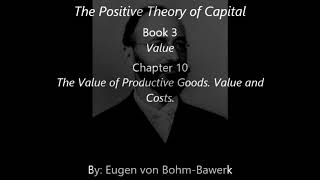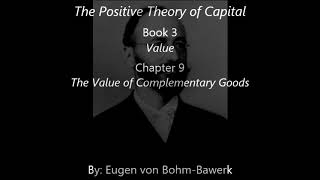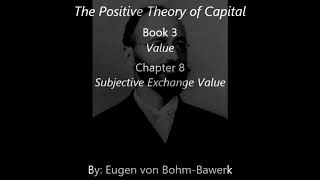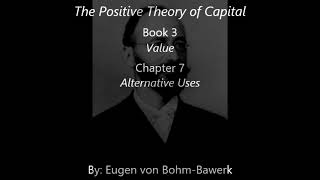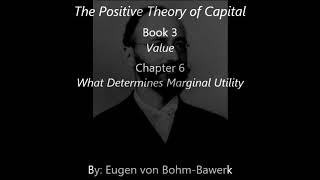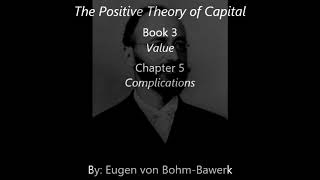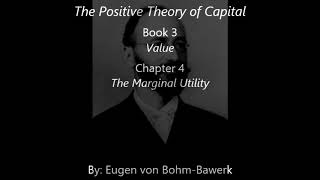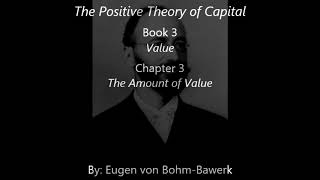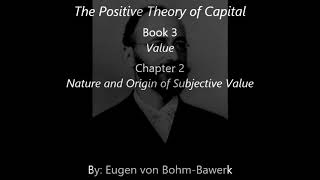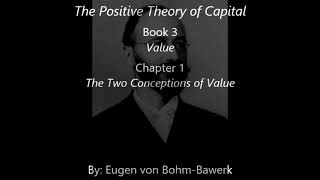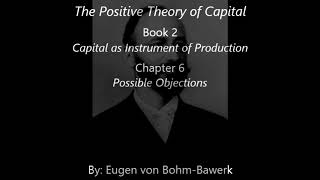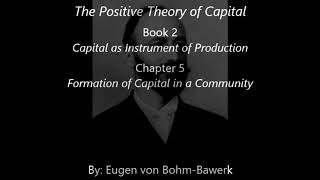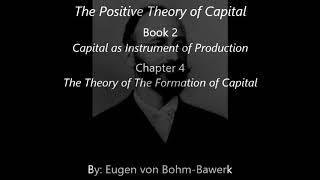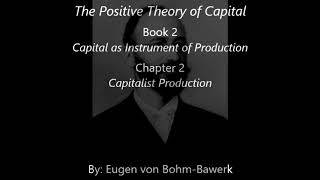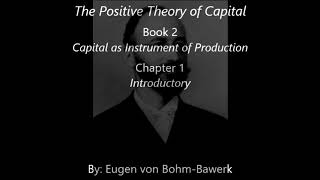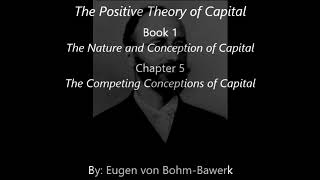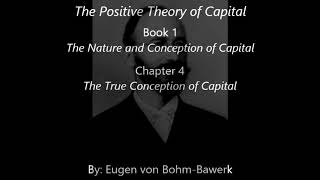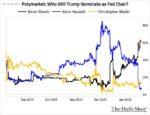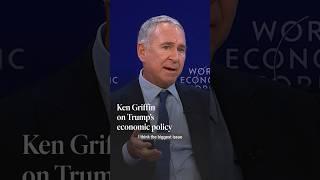Category Archive: 6b.) Bawerk
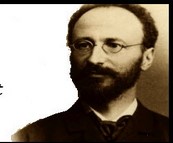
Eugen von Bohm-Bawerk: The Positive Theory of Capital: Book 3: Chapter 10
The Positive Theory of Capital:
Book 3: Value
Chapter 10: The Value of Productive Goods. Value and Costs
Eugen von Bohm-Bawerk (1851 - 1914) was an Austrian Economist, who was influenced by Carl Menger, and served as the Austrian Minister of Finance between 1895 and 1904. In the book The Positive Theory of Capital Eugen brings up six sections: Capital as an Instrument of Production, Value, Price, Present and Future, The Source of Interest, and The...
Read More »
Read More »
Eugen von Bohm-Bawerk: The Positive Theory of Capital: Book 3: Chapter 9
The Positive Theory of Capital:
Book 3: Value
Chapter 9: The Value of Complementary Goods
Eugen von Bohm-Bawerk (1851 - 1914) was an Austrian Economist, who was influenced by Carl Menger, and served as the Austrian Minister of Finance between 1895 and 1904. In the book The Positive Theory of Capital Eugen brings up six sections: Capital as an Instrument of Production, Value, Price, Present and Future, The Source of Interest, and The Rate of...
Read More »
Read More »
Eugen von Bohm-Bawerk: The Positive Theory of Capital: Book 3: Chapter 8
The Positive Theory of Capital:
Book 3: Value
Chapter 8: Subjective Exchange Value
Eugen von Bohm-Bawerk (1851 - 1914) was an Austrian Economist, who was influenced by Carl Menger, and served as the Austrian Minister of Finance between 1895 and 1904. In the book The Positive Theory of Capital Eugen brings up six sections: Capital as an Instrument of Production, Value, Price, Present and Future, The Source of Interest, and The Rate of Interest....
Read More »
Read More »
Eugen von Bohm-Bawerk: The Positive Theory of Capital: Book 3: Chapter 7
The Positive Theory of Capital:
Book 3: Value
Chapter 7: Alternative Uses
Eugen von Bohm-Bawerk (1851 - 1914) was an Austrian Economist, who was influenced by Carl Menger, and served as the Austrian Minister of Finance between 1895 and 1904. In the book The Positive Theory of Capital Eugen brings up six sections: Capital as an Instrument of Production, Value, Price, Present and Future, The Source of Interest, and The Rate of Interest.
Want to own...
Read More »
Read More »
Eugen von Bohm-Bawerk: The Positive Theory of Capital: Book 3: Chapter 6
The Positive Theory of Capital:
Book 3: Value
Chapter 6: What Determines Marginal Utility
Eugen von Bohm-Bawerk (1851 - 1914) was an Austrian Economist, who was influenced by Carl Menger, and served as the Austrian Minister of Finance between 1895 and 1904. In the book The Positive Theory of Capital Eugen brings up six sections: Capital as an Instrument of Production, Value, Price, Present and Future, The Source of Interest, and The Rate of...
Read More »
Read More »
Eugen von Bohm-Bawerk: The Positive Theory of Capital: Book 3: Chapter 5
The Positive Theory of Capital:
Book 3: Value
Chapter 5: Complications
Eugen von Bohm-Bawerk (1851 - 1914) was an Austrian Economist, who was influenced by Carl Menger, and served as the Austrian Minister of Finance between 1895 and 1904. In the book The Positive Theory of Capital Eugen brings up six sections: Capital as an Instrument of Production, Value, Price, Present and Future, The Source of Interest, and The Rate of Interest.
Want to own a...
Read More »
Read More »
Eugen von Bohm-Bawerk: The Positive Theory of Capital: Book 3 Chapter 4
The Positive Theory of Capital:
Book 3: Value
Chapter 4: The Marginal Utility
Eugen von Bohm-Bawerk (1851 - 1914) was an Austrian Economist, who was influenced by Carl Menger, and served as the Austrian Minister of Finance between 1895 and 1904. In the book The Positive Theory of Capital Eugen brings up six sections: Capital as an Instrument of Production, Value, Price, Present and Future, The Source of Interest, and The Rate of Interest.
Want to...
Read More »
Read More »
Eugen von Bohm-Bawerk: The Positive Theory of Capital: Book 3: Chapter 3
The Positive Theory of Capital:
Book 3: Value
Chapter 3: The Amount of Value
Eugen von Bohm-Bawerk (1851 - 1914) was an Austrian Economist, who was influenced by Carl Menger, and served as the Austrian Minister of Finance between 1895 and 1904. In the book The Positive Theory of Capital Eugen brings up six sections: Capital as an Instrument of Production, Value, Price, Present and Future, The Source of Interest, and The Rate of Interest.
Want to...
Read More »
Read More »
Eugen von Bohm-Bawerk: The Positive Theory of Capital: Book 3: Chapter 2
The Positive Theory of Capital:
Book 3: Value
Chapter 2: Nature and Origin of Subjective Value
Eugen von Bohm-Bawerk (1851 - 1914) was an Austrian Economist, who was influenced by Carl Menger, and served as the Austrian Minister of Finance between 1895 and 1904. In the book The Positive Theory of Capital Eugen brings up six sections: Capital as an Instrument of Production, Value, Price, Present and Future, The Source of Interest, and The Rate of...
Read More »
Read More »
Eugen von Bohm-Bawerk: The Positive Theory of Capital: Book 3: Chapter 1
The Positive Theory of Capital:
Book 3: Value
Chapter 1: The Two Conceptions of Value
Eugen von Bohm-Bawerk (1851 - 1914) was an Austrian Economist, who was influenced by Carl Menger, and served as the Austrian Minister of Finance between 1895 and 1904. In the book The Positive Theory of Capital Eugen brings up six sections: Capital as an Instrument of Production, Value, Price, Present and Future, The Source of Interest, and The Rate of Interest....
Read More »
Read More »
Eugen von Bohm-Bawerk: The Positive Theory of Capital: Book 2: Chapter 6
The Positive Theory of Capital:
Book 2: Capital as Instrument of Production
Chapter 6: Possible Objections
Eugen von Bohm-Bawerk (1851 - 1914) was an Austrian Economist, who was influenced by Carl Menger, and served as the Austrian Minister of Finance between 1895 and 1904. In the book The Positive Theory of Capital Eugen brings up six sections: Capital as an Instrument of Production, Value, Price, Present and Future, The Source of Interest, and...
Read More »
Read More »
Eugen von Bohm-Bawerk: The Positive Theory of Capital: Book 2: Chapter 5
The Positive Theory of Capital:
Book 2: Capital as Instrument of Production
Chapter 5: Formation of Capital in a Community
Eugen von Bohm-Bawerk (1851 - 1914) was an Austrian Economist, who was influenced by Carl Menger, and served as the Austrian Minister of Finance between 1895 and 1904. In the book The Positive Theory of Capital Eugen brings up six sections: Capital as an Instrument of Production, Value, Price, Present and Future, The Source of...
Read More »
Read More »
Eugen von Bohm-Bawerk: The Positive Theory of Capital: Book 2: Chapter 4
The Positive Theory of Capital:
Book 2: Capital as Instrument of Production
Chapter 4: The Theory of the Formation of Capital
Eugen von Bohm-Bawerk (1851 - 1914) was an Austrian Economist, who was influenced by Carl Menger, and served as the Austrian Minister of Finance between 1895 and 1904. In the book The Positive Theory of Capital Eugen brings up six sections: Capital as an Instrument of Production, Value, Price, Present and Future, The Source...
Read More »
Read More »
Znani ekonomiści w kwadrans – pytania i odpowiedzi: Menger, Böhm-Bawerk, Schumpeter
Dr hab. Mateusz Machaj odpowiada na Wasze pytania dotyczące Carla Mengera, Eugena von Böhm-Bawerka i Josepha Schumpetera.
Jeśli chcesz więcej webinarów, wesprzyj Instytut darowizną: https://mises.pl/przekaz-darowizne/
Read More »
Read More »
Eugen von Bohm-Bawerk: The Positive Theory of Capital: Book 2: Chapter 3
The Positive Theory of Capital:
Book 2: Capital as Instrument of Production
Chapter 3: The Function of Capital in Production
Eugen von Bohm-Bawerk (1851 - 1914) was an Austrian Economist, who was influenced by Carl Menger, and served as the Austrian Minister of Finance between 1895 and 1904. In the book The Positive Theory of Capital Eugen brings up six sections: Capital as an Instrument of Production, Value, Price, Present and Future, The Source...
Read More »
Read More »
Eugen von Bohm-Bawerk: The Positive Theory of Capital: Book 2: Chapter 2
The Positive Theory of Capital:
Book 2: Capital as Instrument of Production
Chapter 2: Capitalist Production
Eugen von Bohm-Bawerk (1851 - 1914) was an Austrian Economist, who was influenced by Carl Menger, and served as the Austrian Minister of Finance between 1895 and 1904. In the book The Positive Theory of Capital Eugen brings up six sections: Capital as an Instrument of Production, Value, Price, Present and Future, The Source of Interest, and...
Read More »
Read More »
Eugen von Bohm-Bawerk: The Positive Theory of Capital: Book 2: Chapter 1
The Positive Theory of Capital:
Book 2: Capital as Instrument of Production
Chapter 1: Introductory
Eugen von Bohm-Bawerk (1851 - 1914) was an Austrian Economist, who was influenced by Carl Menger, and served as the Austrian Minister of Finance between 1895 and 1904. In the book The Positive Theory of Capital Eugen brings up six sections: Capital as an Instrument of Production, Value, Price, Present and Future, The Source of Interest, and The Rate...
Read More »
Read More »
Eugen von Bohm-Bawerk: The Positive Theory of Capital: Book 1: Chapter 6
The Positive Theory of Capital:
Book 1: The Nature and Conception of Capital
Chapter 6: Social and Private Capital
Eugen von Bohm-Bawerk (1851 - 1914) was an Austrian Economist, who was influenced by Carl Menger, and served as the Austrian Minister of Finance between 1895 and 1904. In the book The Positive Theory of Capital Eugen brings up six sections: Capital as an Instrument of Production, Value, Price, Present and Future, The Source of...
Read More »
Read More »
Eugen von Bohm-Bawerk: The Positive Theory of Capital: Book 1: Chapter 5
The Positive Theory of Capital:
Book 1: The Nature and Conception of Capital
Chapter 5: The Competing Conceptions of Capital
Eugen von Bohm-Bawerk (1851 - 1914) was an Austrian Economist, who was influenced by Carl Menger, and served as the Austrian Minister of Finance between 1895 and 1904. In the book The Positive Theory of Capital Eugen brings up six sections: Capital as an Instrument of Production, Value, Price, Present and Future, The Source...
Read More »
Read More »
Eugen von Bohm-Bawerk: The Positive Theory of Capital: Book 1: Chapter 4
The Positive Theory of Capital:
Book 1: The Nature and Conception of Capital
Chapter 4: The True Conception of Capital
Eugen von Bohm-Bawerk (1851 - 1914) was an Austrian Economist, who was influenced by Carl Menger, and served as the Austrian Minister of Finance between 1895 and 1904. In the book The Positive Theory of Capital Eugen brings up six sections: Capital as an Instrument of Production, Value, Price, Present and Future, The Source of...
Read More »
Read More »









